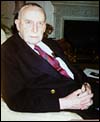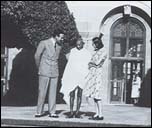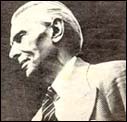'Had Patel and Liaquat Ali Khan lived for five more years, the history of the subcontinent would have taken a different route'
The players and the game
 No doubt Kashmir remains a painful dispute, a source of tension and
mistrust, and a memory of those difficult days when great men like Nehru,
Patel, Jinnah, and Mountbatten fought over territory, Campbell-Johnson says, "One reason why there
have been such bitter wars is that deep down no one liked Partition, but they all accepted it."
No doubt Kashmir remains a painful dispute, a source of tension and
mistrust, and a memory of those difficult days when great men like Nehru,
Patel, Jinnah, and Mountbatten fought over territory, Campbell-Johnson says, "One reason why there
have been such bitter wars is that deep down no one liked Partition, but they all accepted it."
Campbell-Johnson narrates an incident when Mountbatten asked Jinnah if he agreed to
the solution to which Jinnah replied: `I do not agree, but I accept.'
"Mountbatten was annoyed with this reply, but he didn't say anything,"
he recalls. "No one agreed, they accepted; it wasn't the best
solution, it was the only solution. Everyone had overplayed their hand, and
thus accepted what they got."
 So according to Mountbatten, which way should Kashmir have gone?
"Mountbatten clearly believed that the Act of Accession was to be signed by
the king concerned. He should consider the religion of the majority of his
people, but if he didn't, his decision was final."
So according to Mountbatten, which way should Kashmir have gone?
"Mountbatten clearly believed that the Act of Accession was to be signed by
the king concerned. He should consider the religion of the majority of his
people, but if he didn't, his decision was final."
Leaving Edwina aside, some historians have claimed that the fact that
Mountbatten and Nehru got along very well hurt Jinnah and his cause.
"Actually, it is probably the other way round," said Campbell-Johnson. "The fact
that Mountbatten did not get along with Jinnah made the viceroy go out of
his way to ensure that he played fair with Jinnah, and protect his
interest, perhaps more so than if he had been friendly with him."
But that could also mean that since Nehru and Mountbatten did get along
very well, India's interest might have been hurt. Campbell-Johnson corrects me.
"They didn't get along very well, they got along. And Mounbatten wasn't
bothered about his relations with Jinnah, it just made it a bit more
difficult."
But was not India's interest compromised by the Nehru-Mounbatten
friendship? "No, they were not, because the key person we had to deal with
was Patel, not Nehru. Without Patel, you could not get anything done. So
Jinnah had to ensure that any deal he tried to implement would have Patel's
consent, otherwise there would have been no agreement, and Jinnah would
have been the final loser."
 Campbell-Johnson says Nehru was a charming person who had international stature,
but was very weak at administration. Speaking about the role of Patel, whom
Campbell-Johnson termed as an administrator par excellence, in the days preceding
the transfer of power, he said, "Patel was certainly the key person. He, and his eminently capable
secretary V P Menon, brought into India more people than they lost to
Pakistan. He ensured that about 560 Indian princes joined India
without any attachments, whereas earlier, they were all prepared to
negotiate for semi-independent power. He was a person who had little time
for ideologies, he just wanted to get on with the job at hand."
Campbell-Johnson says Nehru was a charming person who had international stature,
but was very weak at administration. Speaking about the role of Patel, whom
Campbell-Johnson termed as an administrator par excellence, in the days preceding
the transfer of power, he said, "Patel was certainly the key person. He, and his eminently capable
secretary V P Menon, brought into India more people than they lost to
Pakistan. He ensured that about 560 Indian princes joined India
without any attachments, whereas earlier, they were all prepared to
negotiate for semi-independent power. He was a person who had little time
for ideologies, he just wanted to get on with the job at hand."
He also places Patel in the centre as far as accepting Partition was
concerned. "Mahatma Gandhi was against Partition all along, but he finally
accepted. But we were more worried about Patel's acceptance; without his
nod, it would never have happened."
I tell him that many Indians firmly believe that had Patel lived, the
Kashmir issue would have been resolved, one way or the other, and that
Nehru was too emotional on the subject to handle it with clarity. Campbell-Johnson
agrees. "It was a great tragedy for both India and Pakistan that Patel died
so early (December 1950). Had Patel, and Liaquat Ali Khan in Pakistan,
lived for five more years, the history of the subcontinent would have taken
a different route."
 What about Jinnah, who is loved and hated in the subcontinent as no other. "Jinnah
was a rather lonely, remote man, he didn't much like people or have much
charm. Not that it mattered," said Campbell-Johnson. "The person I compare him to
was Charles de Gaulle. Jinnah, like de Gaulle, symbolised a nation. He
didn't go about being friendly, and you had to be like that if you had as
big a task as he had."
What about Jinnah, who is loved and hated in the subcontinent as no other. "Jinnah
was a rather lonely, remote man, he didn't much like people or have much
charm. Not that it mattered," said Campbell-Johnson. "The person I compare him to
was Charles de Gaulle. Jinnah, like de Gaulle, symbolised a nation. He
didn't go about being friendly, and you had to be like that if you had as
big a task as he had."
Jinnah seemed paranoid about Indian intentions, firmly believing that India
was waiting for a chance to gobble up Pakistan despite the assurances of
Indian leaders. He remained extremely distrustful of Congress leaders. Campbell-Johnson,
however, takes a more sympathetic view. "Jinnah died in
September 1948, and he must have known that he was dying, though no one
else knew it. His relations with Liaquat Ali Khan were deteriorating. And he
must have been worried that if he died Pakistan would never be a reality;
he doubted the guts of his followers. We didn't know this in 1947. His
condition was very tense, and maybe this is why he often forced an issue
rather than wait. I am talking now, but today I would sympathise with a man
who had only a limited time on earth."
What was the single quality of Mahatma Gandhi that Campbell-Johnson liked the
most? He replies without hesitation."His sense of humour. Mountbatten
said that Gandhi was a laughing man."
Reflecting further on the Mahatma, he adds, "In my personal view, I
think Gandhi was enormously important at the highest level of human
affairs. He was part of the conscious of mankind and he placed value on
individual human behaviour. You had to conquer violence, especially within
yourself. It may not have been practical, but it gave moral value to the
Independence movement. And this still remains the aim and aspiration of the
world in the most violent century in recorded history."
 Most certainly, Campbell-Johnson holds Lord Mountbatten in very high opinion, with whom
he worked during World War II. He describes him as
a person with boundless energy and extremely decisive in
implementing policies.
Most certainly, Campbell-Johnson holds Lord Mountbatten in very high opinion, with whom
he worked during World War II. He describes him as
a person with boundless energy and extremely decisive in
implementing policies.
"After Mounbatten was summoned to become the viceroy, he called me and told
me about it, and asked me to be ready to accompany him. It may appear
strange today, but Mountbatten was not too keen to accept the assignment
which has immortalised him because it took him away from the Royal navy.
He felt his naval career was being sacrificed for a task which was not
considered to have much chance of success. I feel proud and honoured to
have served under him."
|

